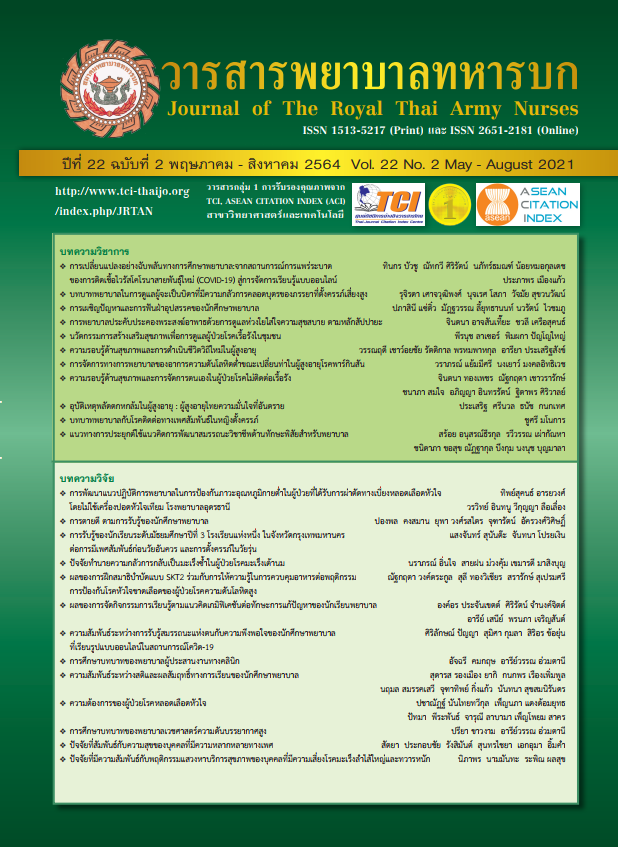Effects of The Transtheoretical Model Application for Eating Behaviors in Non-Commissioned Officers with Metabolic Syndrome
Keywords:
dietary behaviours, transtheoretical model, metabolic syndromeAbstract
This quasi-experimental study aims to investigate the effectiveness of the Transtheoretical model based dietary behavioural modification programme in non-commissioned officers with metabolic syndrome. Participants were divided into intervention and control group of 32 participants in each group. Transtheoretical model based dietary behavioural modification programme was delivered in the intervention group. and was evaluated by specific dietary behaviours questionnaires and evaluation forms. The evaluation was carried out at pre and post intervention period and the follow-up period. Statistical analysis consisted of descriptive and inferential statistics including percentage, mean, standard deviation, Independent t-test, and Repeated Measure one-way ANOVA.
The intervention group revealed higher dietary behaviours score at the post-intervention period compared with the pre-intervention period with statistical significance (p < .05). During the follow-up period, the intervention group also performed higher self-determination, perceived behavioural control, and dietary behaviours score than both pre-intervention and post-intervention periods with statistical significance (p < .05). The intervention group also received higher self-determination and perceive behavioural control score than the control group during the follow-up period (p < .05).
Downloads
References
Potisat S., Cooney N., Udomchairat R., Preechachaiyavit P., Konla-iat S., Mirattanaphrai S., & Sainamyen K. Literature Review: The current situation and care model of non-communicable disease. Nonthaburi: Art Qualified; 2014. (in Thai)
Delon S., & Mackinnon B. Alberta’s systems approach to chronic disease management and prevention utilizing the expanded chronic care model. Healthcare Quarterly. 2009; 13: 98-104.
American Diabetes Association. Standards of medical care in diabetes-2015. Diabetes care. 2015; 38(1): S1-S90.
Eakpalakorn V. Report of the 5th Thai Health Survey by Physical Examination 2014. Bangkok: Aksorn Graphic and Design Publishing House; 2014. (in Thai)
Boonsan M., Kasipol T., & Durongritichai V. Factors Predicting Health Behaviors on Nutrition and Exercise Among Royal Thai Army Military With Metabolic Syndrome at Nawamintharachini Fort, Chonburi Province. Journal of The Thai Army Nurses. 2014; 15(2): 312-319. (in Thai)
Grundy S.M., Hansen B., Smith S.C. Jr., Cleeman J.I., & Kahn R.A. Clinical management of metabolic syndrome: report of the American Heart Association/National Heart: Lung and Blood Institute/American Diabetes association conference on scientific issue related to management. Circulation. 2004; 109(4): 551-556.
Prochaska J.O., & DiClemente C.C. The transtheoretical approach: crossing traditional boundaries of therapy, Dow Jones-Irwin: Homewood; 1984.
Alberti K.G., Zimmet P., & Shaw J. IDF Epidermiology Task Force Consensus Group: The metabolic syndrome - a new worldwide definition. Lancet. 2005; 366(9491): 1059-1062.
Kumla-or A., & Rawiworrakul T. Effects of the Transtheoretical Model Application to Promote Hypertension Prevention Behaviors in Non-Commissioned Officers, Lopburi Province. Journal of The Thai Army Nurses. 2011; 12: 42-50. (in Thai)
Downloads
Published
How to Cite
Issue
Section
License
บทความหรือข้อคิดเห็นใดใดที่ปรากฏในวารสารพยาบาลทหารบกเป็นวรรณกรรมของผู้เขียน ซึ่งบรรณาธิการหรือสมาคมพยาบาลทหารบก ไม่จำเป็นต้องเห็นด้วย
บทความที่ได้รับการตีพิมพ์เป็นลิขสิทธิ์ของวารสารพยาบาลทหารบก
The ideas and opinions expressed in the Journal of The Royal Thai Army Nurses are those of the authors and not necessarily those
of the editor or Royal Thai Army Nurses Association.






